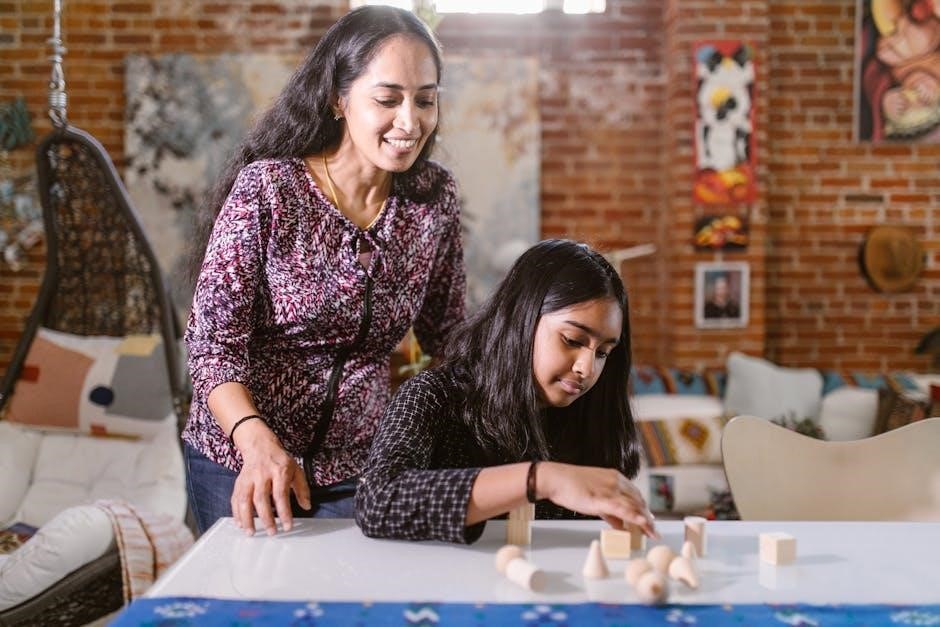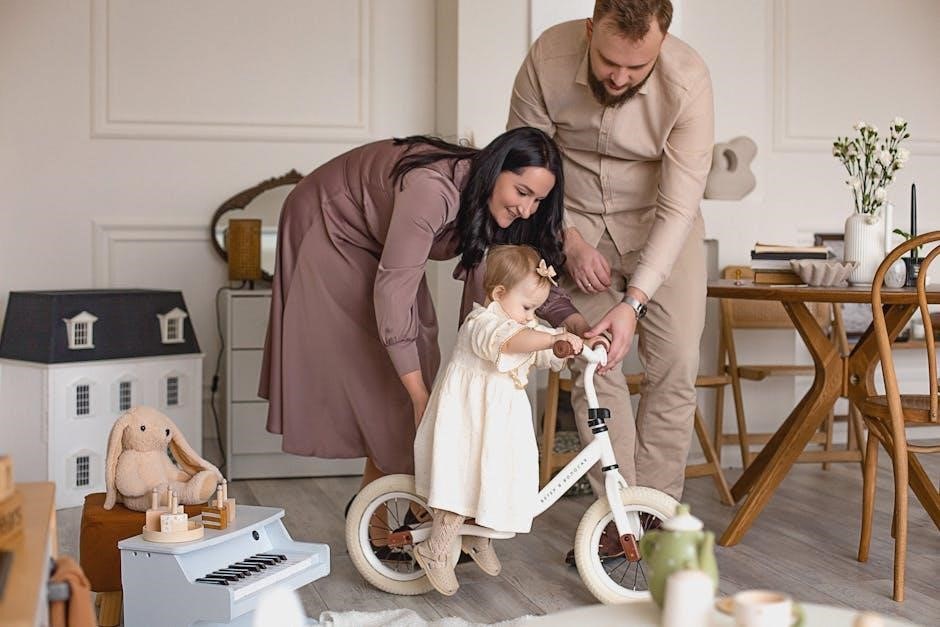Happiness is a skill that can be cultivated through intentional practices like gratitude and mindfulness. It’s about making conscious choices to nurture joy and fulfillment daily.
Why Happiness is Life’s Most Important Skill
Happiness is life’s most important skill because it directly impacts every aspect of human well-being. It enhances emotional resilience, improves mental health, and fosters meaningful relationships. When individuals cultivate happiness, they gain the ability to navigate life’s challenges with greater ease and optimism. Happiness also amplifies creativity, productivity, and overall life satisfaction. By prioritizing happiness, people can create a foundation for personal growth and fulfillment. It is not merely a feeling but a skill that, when mastered, leads to a more purposeful and joyful existence. Investing time in developing happiness skills ensures a lifelong journey of well-being and success in all areas of life.
Understanding Happiness as a Learnable Skill
Happiness is not an innate trait but a skill that can be learned and strengthened over time. Like any skill, it requires practice, consistency, and patience. Research shows that by adopting practices such as gratitude, mindfulness, and contribution, individuals can enhance their ability to experience joy and fulfillment. Happiness skills are built through intentional habits that rewire the brain to focus on positive experiences and emotions. Understanding that happiness is a learnable skill empowers individuals to take control of their well-being, making it achievable regardless of external circumstances. This perspective transforms happiness from a passive state into an active pursuit, offering a pathway to lasting life satisfaction.
The Science of Happiness
The science of happiness reveals that it stems from brain chemistry, emotions, and life experiences. Neuroscience shows that happiness involves neurotransmitters like dopamine and serotonin, influencing mood and well-being.
How the Brain Processes Happiness
The brain processes happiness through neurotransmitters like dopamine, serotonin, and endorphins, which create feelings of joy and satisfaction. These chemicals are released during positive experiences, reinforcing behaviors that promote well-being. Research shows that practices such as mindfulness and gratitude can strengthen neural pathways associated with happiness, making it easier to experience joy over time. Additionally, the brain’s prefrontal cortex plays a role in regulating emotions, helping to maintain a positive outlook even in challenging situations. By understanding how the brain processes happiness, individuals can adopt strategies to enhance their emotional well-being and build lasting fulfillment. This biological foundation underscores the importance of intentional practices in cultivating happiness as a skill.
The Role of Emotions in Developing Happiness Skills
Emotions play a vital role in developing happiness skills, as they influence thoughts, behaviors, and overall well-being. Positive emotions like gratitude, joy, and love enhance happiness by fostering resilience and optimism. Conversely, negative emotions, if unmanaged, can hinder progress. Understanding and managing emotions is key to cultivating happiness. Practices such as mindfulness and emotional awareness help individuals recognize and regulate their feelings, allowing them to respond constructively to challenges. By learning to balance and harness emotions, people can build stronger happiness skills, leading to a more fulfilling life. Emotional intelligence is thus a cornerstone in the pursuit of lasting happiness, enabling individuals to navigate life’s ups and downs with greater ease and positivity.
Key Happiness Skills to Develop
Cultivating gratitude, mindfulness, and contribution are essential happiness skills. These practices foster emotional well-being, joy, and fulfillment, empowering individuals to live a happier, more purposeful life.
Gratitude: The Foundation of Happiness
Gratitude is a powerful catalyst for happiness, fostering a positive mindset and emotional well-being. By focusing on what we already have, rather than what we lack, gratitude shifts our perspective to appreciate life’s small joys. Regularly practicing gratitude, such as through journaling or reflection, builds new neural pathways, making it a habit. This practice not only enhances joy but also strengthens relationships and resilience. Small, consistent acts of gratitude, like thanking someone or acknowledging nature’s beauty, create lasting changes. Over time, gratitude becomes a foundational skill, helping us navigate challenges with optimism and fostering a deeper sense of fulfillment in life.
Mindfulness: Staying Present for Joy
Mindfulness is the practice of being fully engaged in the present moment, fostering joy and reducing stress. By cultivating awareness of thoughts, emotions, and sensations without judgment, mindfulness helps us appreciate life’s beauty. Simple techniques like meditation or deep breathing can ground us in the now. Regular mindfulness practice enhances emotional regulation, allowing us to savor positive experiences and approach challenges calmly. Engaging the senses—like noticing nature’s sights or sounds—can deepen mindfulness. Consistency is key; even a few minutes daily can create lasting changes. Over time, mindfulness becomes a powerful tool for embracing joy and living a more fulfilling, present-centered life.
Contribution: Finding Fulfillment by Helping Others
Contribution is a vital happiness skill, as helping others fosters fulfillment and purpose. Acts of kindness, whether small gestures or larger commitments, create positive emotional connections. Volunteering, mentoring, or simply supporting a friend can enhance well-being. Contribution doesn’t require grand acts; even daily expressions of empathy or support can make a difference. Research shows that helping others releases endorphins, boosting mood and life satisfaction. By focusing on what we can give, we shift from self-centeredness to a sense of community and connection. This shift not only benefits others but also enriches our own lives, creating a cycle of joy and fulfillment that strengthens over time.

Creating a Personal Happiness Plan
A personal happiness plan involves setting clear goals and practicing skills like gratitude and mindfulness. Consistency and self-compassibility are key to fostering lasting well-being and joy.
Clarifying Your Vision for a Happy Life
Clarifying your vision for a happy life involves defining what happiness means to you personally. Reflect on your core values and long-term aspirations to create a clear roadmap. Identify specific activities and habits that align with your vision, such as nurturing relationships or pursuing passions. This step helps in setting meaningful goals and maintaining direction. Consistency is key, as small, intentional steps can lead to lasting fulfillment. By understanding your unique vision, you can tailor your efforts to build a life that truly reflects your definition of happiness.
Setting Goals for Building Happiness Skills
Setting clear, achievable goals is essential for developing happiness skills. Start by identifying specific skills you want to cultivate, such as gratitude or mindfulness. Break these into smaller, manageable steps, like journaling daily or practicing meditation for five minutes. Establish a timeline and track your progress to stay motivated. Celebrate milestones, no matter how small, to reinforce positive habits. Remember, consistency is more important than perfection; Regular practice strengthens neural pathways, making happiness a lasting part of your life.

The Role of Relationships in Happiness
Surrounding yourself with positive, supportive people enhances happiness. Nurturing relationships fosters emotional well-being and provides a sense of belonging and joy.

Surrounding Yourself with Positive Influences
Positive relationships are crucial for fostering happiness. Being around supportive, joyful people elevates your mood and encourages a optimistic mindset. Surrounding yourself with positive influences creates an environment where happiness thrives. These individuals inspire gratitude, empathy, and shared joy, which are essential for emotional well-being. Consistency in nurturing these relationships helps build resilience against life’s challenges. However, it’s important to remember that happiness grooming isn’t about perfection; it’s about progress. Even on tough days, the support of loved ones can reignite your motivation to practice happiness skills. By cultivating meaningful connections, you create a foundation for long-term fulfillment and a vibrant happiness journey.

Overcoming Obstacles to Happiness
Accepting setbacks and practicing resilience are key to sustaining happiness. Challenges are opportunities to grow, and consistent effort ensures progress, even when perfection isn’t achievable.
Dealing with Setbacks and Maintaining Progress
Setbacks are inevitable, but they don’t define your journey. Instead of viewing them as failures, approach them as learning opportunities. Acknowledge your emotions without judgment and remind yourself that progress, not perfection, is the goal. Consistency is key—missing a day of practice doesn’t erase previous efforts. Focus on small, manageable steps to rebuild momentum. Celebrate each tiny win, as they accumulate into significant growth. Surround yourself with supportive people who encourage resilience. Mindfulness and gratitude can help shift your perspective, turning obstacles into stepping stones. Remember, happiness is a skill that strengthens with time and effort, even in the face of challenges.
Happiness is a lifelong journey requiring consistent practice and resilience. By nurturing mindfulness, gratitude, and positive relationships, you can sustain joy and create a fulfilling life.
Practical Tips for Daily Happiness Practice
Incorporate daily habits like gratitude journaling, mindfulness meditation, and connecting with positive individuals. Start each morning by envisioning your ideal day. Practice acts of kindness and savor joyful moments. Set achievable goals and celebrate small victories. Consistency is key, but remember progress over perfection. Engage in activities that bring you joy and fulfillment. Limit negative influences and focus on self-care. Smile often, as it triggers happiness chemicals in the brain. Embrace challenges as growth opportunities rather than setbacks. By integrating these practices, you cultivate lasting happiness and resilience, making joy a sustainable part of your life.
The Lifelong Journey of Mastering Happiness
Happiness is a lifelong journey requiring dedication and self-awareness. It involves continuously refining skills like gratitude, mindfulness, and contribution. Embrace setbacks as learning opportunities. Surround yourself with supportive relationships and positive influences. Cultivate optimism and resilience to navigate life’s challenges. Celebrate small wins and maintain a growth mindset. Over time, these practices become second nature, fostering enduring joy and fulfillment. Happiness is not a destination but a dynamic process of growth and adaptation, leading to a richer, more meaningful life.
